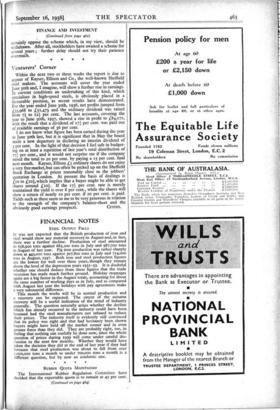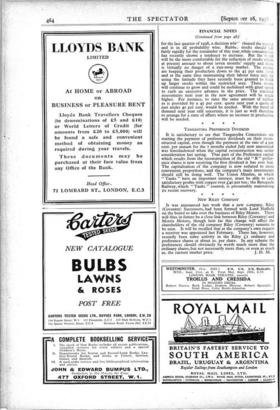FINANCIAL NOTES
STEEL OUTPUT FALLS
Jr was not expected that the British production of iron and steel would show any material recovery in August and, in fact, there was a further decline. Production of steel amounted to 658,900 tons against 683,200 tons in July and 987,700 tons in August of last year. Pig iron production was rather sharply down at 443,000 tons against 507,800 tons in July and 714,000 tons in August, 1937. Both iron and steel production figures are the lowest for well over three years, though they remain above the level of the depression years 1931-33. It is doubtful whether one should deduce from these figures that the trade recession has made much further ground. Holiday stoppages again are a big factor in the August totals, accounting for about the same number of working days as in July, and as compared with August last year the holidays with pay agreements make a very substantial difference.
This month the works will be in normal production and a recovery can be expected. The extent of the autumn recovery will be a useful indication of the trend of industry generally. The question naturally arises whether the decline which has already occurred in the industry could have been lessened had the steel manufacturers not refused to reduce their prices. The industry itself is evidently still convinced that its policy was right and that had hesitancy been shown buyers might have held off the market sooner and in even greater force than they did. They are probably right, too, in feeling that nothing can usefully be done now, since the whole question of prices during 1939 will come under careful dis- cussion in the next few months. Whether they would have taken the decision they did at the end of last year if they had foreseen that steel production was about to fall from over t,000,000 tons a month to under 700,000 tons a month is a different question, but by now an academic one.
RUBBER QUOTA MAINTAINED
The International Rubber Regulation Committee have decided that the exportable quota is to remain at 45 per cent.
(Continued on page 464)
FINANCIAL NOTES (Continued from page 463' for the last quarter of 1938, a decision whi-' pleased the market and is in all probability wise. Rubbt: stocks should tall fairly rapidly for the remainder of this year, while consumption has recently shown a tendency to increase. But the w,.rld will be the more comfortable for the reduction of stocks which at present amount to about seven months' supply and there is virtually no danger of a run-away market. The estates are keeping their production down to the 45 per cent, level and at the same time maintaining their labour force only by using the latitude they have recently been granted to build up larger stocks within the restricted area. These stocks will continue to grow and could be mobilised with great speed to curb an excessive advance in the price. The standard assessments next year in the new agreement will be much higher. For instance, to raise the same amount of rubber as is provided by a 45 per cent. quota next year a quota of just under 40 per cent. would be needed. With the trend of demand next year still uncertain, it is just as well therefore to arrange for a state of affairs where an increase in production will be needed.
TANGANYIKA PREFERENCE DIVIDEND It is satisfactory to see that Tanganyika Concessions are starting the payment of preference dividends on their recon- structed capital, even though the payment at the rate of 4 per cent, per annum for the 7 months ended July now announced was foreshadowed when the capital reconstruction was under consideration last spring. That part of the Preference capital which results from the reconstruction of the old " B " prefer- ence shares is now receiving the first dividend it has ever had. The capitalisation of the company is now reduced to more convenient proportions, and the company's main investments should still be doing well. The Union Miniere, in which " Tanks " have an important interest, must be able to earn satisfactory profits with copper over £40 per ton ; the Beneguela Railway, which " Tanks " control, is presumably maintaining its recent recovery.
NEW RILEY COMPANY It was announced last week that a new company, Riley (Coventry) Successors, had been formed with Lord Nuffield on the board to take over the business of Riley Motors. There will thus in future be a close link between Riley (Coventry) and Morris Motors, though how far this change will affect the shareholders of the old company Riley (Coventry) remains to be seen. It will be recalled that at the company's own request a receiver was appointed last February. There has, however, recently been some activity in the Riley Lx ordinary and preference shares at about 2s. per share. In any scheme the 'preferences should obviously be worth much more than the ordinary shares, but not necessarily more than, or even as much











































 Previous page
Previous page